
Topics
Guests
- Dr. Nabeel Hameedneurosurgeon at Salmaniya Hospital in Manama, Bahrain. He was arrested and allegedly brutalized for treating an injured protester. He resumed work at Salmaniya last month after a year’s suspension.
Human rights organizations are criticizing the Obama administration’s decision to resume military sales to Bahrain despite the ruling monarchy’s ongoing repression of pro-democracy protests. The State Department has said it will allow a multi-million-dollar weapons shipment to the Bahraini government, citing “national security interests.” The announcement came just days after the Bahraini government vowed “tougher action” in its crackdown on protesters. We’re joined by Dr. Nabeel Hameed, who is one of Bahrain’s only neurosurgeons and among dozens of Bahraini physicians and nurses who have been arrested and tried for treating anti-government protesters. After a three-month prison stint that he says included abuse and torture, Dr. Hameed is expected to be tried by a Bahraini court soon after he returns home. “There is this silence, this deafening silence, from the world governments [about Bahrain],” he says. “There is a situation which is really getting worse and worse. And if you don’t really stop it here, it may get really, really bad in the future. … You don’t have to wait until the violence propagates out of control.” [includes rush transcript]
Transcript
AMY GOODMAN: Human rights groups are criticizing the Obama administration’s decision to resume military sales to Bahrain despite the ruling monarchy’s ongoing repression of pro-democracy protests. The State Department has said it will allow a multi-million-dollar weapons shipment to the Bahraini government, citing, quote, “national security interests.” The announcement came just days after the Bahraini government vowed “tougher action” in its crackdown on protesters.
Meanwhile, prominent human rights activist Nabeel Rajab remains in prison. So does Abdulhadi Alkhawaja, who has been on hunger strike for more than three months. Bahrain is a key strategic ally of the United States in the Middle East, home to the U.S. Navy’s Fifth Fleet.
As the United States confirmed the weapons sale, thousands of Bahrainis marched near the capital Manama to call for the release of political prisoners.
PROTESTER: [translated] Of course, our demands in Bahrain, demands of all the people, are the demands of everybody for years: democracy, change of regime, the release of prisoners. These are the demands by everyone else in the world. We want the same things.
AMY GOODMAN: Over the past year, dozens of Bahraini doctors and nurses have been arrested and tried for treating anti-government protesters. One of the doctors is joining us here in studio today: Dr. Nabeel Hameed, one of Bahrain’s only neurosurgeons. After he was arrested, he was detained for three months. During this time, he said he was beaten and tortured. He is expected to be tried by a Bahraini court soon after he returns home.
We welcome you to Democracy Now!, Doctor. Explain what happened and what is happening to day in Bahrain.
DR. NABEEL HAMEED: Well, what happened, I think, that after the Arab Spring, the Bahraini people wanted reforms, and inspired by the Arab Spring, they started asking for it. The government cracked down on them very harshly. And the doctors got entangled in the middle. And—
AMY GOODMAN: Explain what happened.
DR. NABEEL HAMEED: Basically, we were at the hospital, most of us on call, and when the crackdown happened, there were a lot of injuries, which needed us to intervene in. And we saw those injuries, we saw the atrocities that were committed to some of these patients, and we treated them. And just for treating these patients, they came back and—I mean, they came on us very harshly, painting us with a traitor image.
AMY GOODMAN: That you treated them. And the name of the hospital?
DR. NABEEL HAMEED: Salmaniya Medical Center.
AMY GOODMAN: And they suspended you first or arrested you first?
DR. NABEEL HAMEED: No, they arrested us first. And I’m speaking in a group, because, like, we’re 48 medics or doctors, nurses, paramedics, ambulance drivers. They arrested us first, and then they suspended us.
AMY GOODMAN: This was last April?
DR. NABEEL HAMEED: This was last year, starting from March. I was arrested on 11th of April.
AMY GOODMAN: And then what happened to you in jail? Where were you taken?
DR. NABEEL HAMEED: I was taken to an interrogation center—it’s called Adliya—kept there for three to four days. It’s very foggy; I cannot tell you precisely—four days or three days—because what I suffered there was horrible. They make you stand for days together, not allowing you to sleep, beat you up. They push you into this room where they beat you up with a whip or a hose on your back, throw you on the ground, abuse you verbally. They even threatened to kill me by a gun, putting a gun to my head. After that three or four days, they throw me in a prison cell. And surprised that I find two of my doctor colleagues there in that prison cell. It’s a five-by-six-meter prison cell with nearly 13 prisoners among them—engineers, university professors, fishermen—I mean, a cross-section population of Bahrain.
AMY GOODMAN: Last month, Al Jazeera English’s May Ying Welsh won the George Polk Award for her documentary, Bahrain: Shouting in the Dark. In it, she describes what you were just describing, what happened to the doctors at Salmaniya Hospital.
MAY YING WELSH: Any uniformed medic caught trying to save protesters at Pearl Roundabout was attacked. Dr. Saadiq Al Ekri, a senior surgeon, was handcuffed and beaten.
DR. SAADIQ AL EKRI: I was wearing the uniform for the doctors. You know, that one would be with the—with the Crescent. Then they tie me, and they attack me, while I’m crying. Then, I don’t know how many people, maybe 10, maybe 20—I don’t remember—are beating—from everywhere, I was being hit by sticks, by legs. Then, I don’t know. Then they—they told me, “Get up, or we will kill you.”
MAY YING WELSH: After breaking Dr. Ekri’s nose and ribs, he says police pulled his pants down and threatened to rape him. Four had died at Pearl Roundabout.
AHMED ABU TAKI: My brother, he was sleeping next to the roundabout. Then, the policeman, he’s coming. Then they shoot him, when he was asleep. He’s going there because he’s looking for work. He’s only 22 years.
AMY GOODMAN: That was May Ying Welsh’s excerpt of a documentary, Bahrain: Shouting in the Dark. These are your colleagues.
DR. NABEEL HAMEED: Yeah. They’re on trial, and I’m on trial, still on trial.
AMY GOODMAN: So, explain what, Dr. Hameed, you’re on trial for.
DR. NABEEL HAMEED: When they took me, they interrogated me, basically, about one of the protesters I treated, and they accused me actually of killing him. They accused me of smashing his head and operating on him just to show, you know, a tarnished image of Bahrain in order to topple the regime. The victim I treated got a bullet to his head, and his injury was really not life-sustaining. And I did my best, couldn’t save him, unfortunately. So we were tried as witnesses, actually. We witnessed certain things, and they want to take our credibility out. That’s why they accused us of these crimes. Other doctors also are accused of the same thing, with—in addition to that, occupation of the—occupying the hospital, stealing equipments from the hospital. All of these things are really nonsense and untrue.
AMY GOODMAN: Last week I spoke with Human Rights Watch Executive Director Kenneth Roth and asked him why the U.S. has not pressured Bahrain to release pro-democracy activists.
KENNETH ROTH: There are two minor reasons and one big reason. You know, the minor reasons are the military base in Bahrain, which the U.S. doesn’t want to lose, concern about Iranian influence just across the Persian Gulf, in the fact that Bahrain has a majority Shia population, like Iran. There’s fear of influence there. But I think the dominant reason is Saudi Arabia. Bahrain is a little island linked by a causeway to Saudi Arabia. And Saudi Arabia simply is not going to tolerate a genuine democracy immediately off its shore, particularly one in which Shias, if there were free elections, could easily prevail. That would set a precedent, in particular, for Saudi Arabia’s Eastern Province, the oil-producing province which itself has a very substantial Shia population. And the monarchy in Saudi Arabia simply is drawing a line and saying, “No way.” And the U.S. is deferring to that.
AMY GOODMAN: That’s Human Rights Watch Executive Director Kenneth Roth. Dr. Nabeel Hameed, can you talk about what it meant to have the Crown Prince of Bahrain in Washington this past week meeting with the Secretary of State, Hillary Clinton, and the resumption of multi-million-dollar sales of weapons to Bahrain, as you go back on trial?
DR. NABEEL HAMEED: Yeah, I’ll start to say that I still have an admiration for the Crown Prince. I mean, I first—I saw him in 2002, actually, on TV saying that he is looking for a Bahrain where every Bahraini is proud, and then I really saw in him a future leader. But what happened in the last week was basically asking for more support from the state to continue this impunity, this culture of impunity in Bahrain, where the torture, the forced—or the use of violence in dealing with protesters just continues. And the Americans, by allowing this arms deal to go on, is actually indirectly empowering these acts of increased violence against protesters.
AMY GOODMAN: Were government officials willing to meet with you, a doctor from Bahrain who faces charges among scores of others?
DR. NABEEL HAMEED: Government doctors—I mean, government—in U.S. government—
AMY GOODMAN: U.S. government officials. Have you met with Congress members, senators?
DR. NABEEL HAMEED: We met—I have met with some, even met with State Department officials.
AMY GOODMAN: Can you talk, finally, about what it means to be here in the United States at the time that these weapons sales are going through to your country? You are one of three neurosurgeons in Bahrain?
DR. NABEEL HAMEED: I’m one of the three, yeah.
AMY GOODMAN: Uh-huh.
DR. NABEEL HAMEED: Two are suspended.
AMY GOODMAN: Two of you are suspended.
DR. NABEEL HAMEED: I’m back—I’m back now, for the last three weeks. They lifted my suspension, and I’m back to the hospital.
AMY GOODMAN: And what is the sentence you face?
DR. NABEEL HAMEED: I told you, when they took me, they interrogated me for, actually, and they told me that I’ll be charged with killing. But later on, this thing just disappeared, and I’m actually charged now with the misdemeanor charges of illegal gathering, propagating lies, or something like that.
AMY GOODMAN: And Abdulhadi Alkhawaja, one of the leading human rights activists, on hunger strike for three months, do you know him?
DR. NABEEL HAMEED: I don’t know him personally, yeah, but I know him now, yeah.
AMY GOODMAN: Do you feel this hunger strike and the situation in Bahrain is getting the attention that it deserves?
DR. NABEEL HAMEED: It is getting attention. He—by doing this hunger strike, he took the voice of Bahrainis to a more global viewing. But the problem is, there is this silence, this deafening silence, from the world governments that—you know, what’s happening in Bahrain is so small compared to other countries, like Syria or Libya. And it is—I’m not denying that what happens in Syria is much, much worse, but also in Bahrain there is a situation which is really getting worse and worse. And if you don’t really stop it here, it may get really, really bad in the future. So you have the chance now to treat it and treat it quite nicely, and so you don’t have to wait until the violence just propagates out of control.
AMY GOODMAN: Dr. Nabeel Hameed, I want to thank you very much for being with us, neurosurgeon at Salmaniya Hospital in Manama, Bahrain, arrested, brutalized for treating an injured protester. He resumed work at Salmaniya last month after a year’s suspension, but continues to face trial with other doctors, nurses and medics for treating pro-democracy activists.
This is Democracy Now!, democracynow.org, The War and Peace Report. When we come back, we’ll talk about GMOs, and we’ll speak with the grandson of the founder of Dr. Bronner’s Magic Soap. Stay with us.

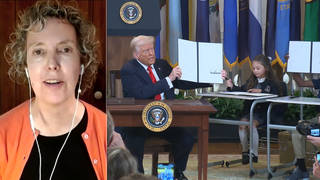
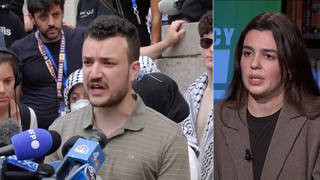
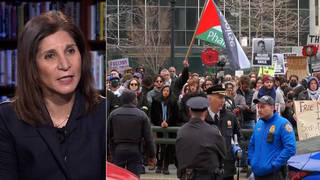
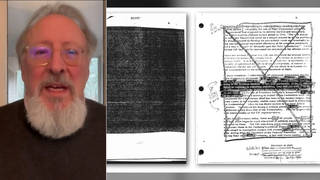





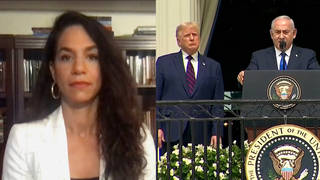
Media Options